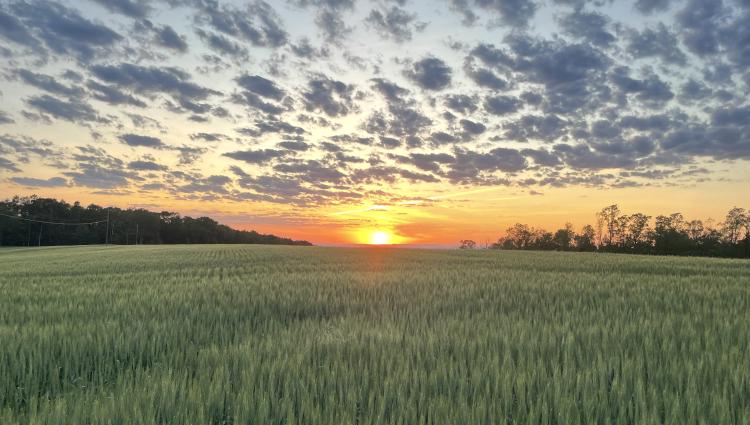Undeveloped Land: The Pros and Cons

What is Undeveloped Land?
Undeveloped land refers to property that has not been developed upon with structures, utilities, or significant human modification. It’s often called raw land, vacant or bare land, and is typically found in rural areas or on the outskirts of developed communities. Since it may lack utilities like water, electricity, and sewage systems, undeveloped land requires additional work before it can be used for construction or farming but can be a high return investment.
Pros of Buying Undeveloped Land
Buying undeveloped land offers several key benefits for buyers seeking flexibility, cost savings, and investment potential.
Lower Purchase Price
One of the most appealing aspects of purchasing land for sale that’s undeveloped is its lower purchase price compared to developed land, since it doesn’t have any existing infrastructure. This makes it a cost-effective option for buyers on a budget or those looking for investment opportunities.
Flexibility
Owning a piece of bare land gives you the freedom to build what you want, how you want. Unlike purchasing a pre-built home or commercial property, raw land allows for full customization. Whether you’re planning to construct a home, farm, or business, the possibilities are virtually limitless – provided you adhere to local zoning laws.
Potential for Increased Value
Land values often appreciate over time, especially in areas with high growth potential. By purchasing undeveloped land in rural areas or regions experiencing population growth, buyers may see a substantial return on their investment over time.
Cons of Buying Undeveloped Land
While the flexibility and lower price of bare land are appealing, there are potential drawbacks that buyers should understand before making a purchase.
Development Costs
Unlike developed land, it requires significant investment to make it usable. Development costs may include:
- Installing utilities like water, electricity, and sewage.
- Constructing access roads.
- Preparing the site for construction with grading, excavation, and clearing.
These costs can quickly add up, so it’s essential to plan for them in your budget. A construction loan may be a good option for funding development projects.
Zoning and Building Restrictions
Local zoning laws dictate what types of structures can be built on the land. For instance, you may not be able to build commercial structures in a residential zone. Always research local zoning laws before purchasing undeveloped land – it might be undeveloped for a reason.
Accessibility and Infrastructure
Access to roads, utilities, and essential services can be limited for undeveloped land in rural areas. Buyers should investigate whether the land has access to existing infrastructure or if they’ll need to invest in creating access points.
Purchasing Undeveloped Land in the Mid-Atlantic Region
The Mid-Atlantic region – which includes Delaware, Maryland, Pennsylvania, Virginia, and West Virginia – offers a wide range of opportunities for buying undeveloped land. This region features diverse landscapes, from open farmland to wooded lots. With loan options to finance the purchase of undeveloped land, this region is ideal for private homesteads or farming properties.
Considerations for the Mid-Atlantic Region:
- Zoning Laws: Each state has specific zoning regulations that may limit how undeveloped land can be used. Researching local zoning laws is crucial.
- Rural Appeal: The Mid-Atlantic is known for its scenic, rural areas, and access to several major metropolitan areas, making it an attractive option for those looking to escape urban life or start a farm, while being close to amenities.
Horizon Farm Credit offers financing options for buyers seeking to purchase land in this region. Our expertise in local land requirements helps you navigate the complexities of undeveloped land purchases.
Horizon Farm Credit’s Role in Financing Undeveloped Land
Financing the purchase of undeveloped land is different from buying a home or real estate. Since bare land doesn’t generate immediate income, lenders view it as a higher-risk investment, often requiring a larger down payment.
Fortunately, lenders like Horizon Farm Credit specialize in land loans for rural properties, recreational and agricultural purposes. With a strong understanding of the Mid-Atlantic market, Horizon Farm Credit offers personalized loan guidance, ensuring buyers get the financing they need to purchase undeveloped land.
Tips for Buying Undeveloped Land
- Do Your Research: Research the land’s zoning regulations, accessibility, and local development plans.
- Negotiate a Fair Price: Don’t assume that vacant land is priced fairly. During the loan application process, our team will order an appraisal and if it under appraises, you can renegotiate with the seller.
- Consult a Land Planner: A land planner or engineer can help you understand the potential uses of the land and assess its development potential.
Key Takeaways
Undeveloped land offers flexibility, affordability, and long-term investment potential. Buyers can build homes, farms, or other custom projects that suit their specific needs. However, there are also challenges, such as development costs, zoning regulations, and access to infrastructure.
If you’re considering buying undeveloped land consider partnering with us – we were created for agriculture and rural America. Our land loan services provide competitive interest rates, flexible terms, and local expertise in the Mid-Atlantic region. Contact us today to get started!